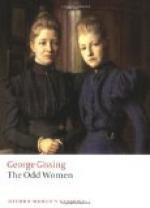On the horizon lay a long, low shape that might have been mistaken for cloud, though it resembled land. It was the Isle of Man. In an hour or two the outline had grown much clearer; the heights and hollows were no longer doubtful. In the north became visible another remote and hilly tract, it was the coast of Scotland beyond Solway Firth.
These distant objects acted as incentives to Rhoda’s imagination. She heard Everard Barfoot’s voice as he talked of travel—of the Orient Express. That joy of freedom he had offered her. Perhaps he was now very near her, anxious to repeat his offer. If he carried out the project suggested at their last interview, she would see him to-day or to-morrow morning—then she must make her choice. To have a day’s walk with him among the mountains would be practically deciding. But for what? If she rejected his proposal of a free union, was he prepared to marry her in legal form? Yes; she had enough power over him for that. But how would it affect his thought of her? Constraining him to legal marriage, would she not lower herself in his estimation, and make the endurance of his love less probable? Barfoot was not a man to accept with genuine satisfaction even the appearance of bondage, and more likely than not his love of her depended upon the belief that in her he had found a woman capable of regarding life from his own point of view—a woman who, when she once, loved, would be scornful of the formalities clung to by feeble minds. He would yield to her if she demanded forms, but afterwards—when passion had subsided—.
A week had been none too long to ponder these considerations by themselves; but they were complicated with doubts of a more disturbing nature. Her mind could not free itself from the thought of Monica. That Mrs. Widdowson was not always truthful with her husband she had absolute proof; whether that supported her fear of an intimacy between Monica and Everard she was unable to determine. The grounds of suspicion seemed to her very grave; so grave, that during her first day or two in Cumberland she had all but renounced the hopes long secretly fostered. She knew herself well enough to understand how jealousy might wreck her life—even if it were only retrospective. If she married Barfoot (forms or none—that question in no way touched this other), she would demand of him a flawless faith. Her pride revolted against the thought of possessing only a share in his devotion; the moment that any faithlessness came to her knowledge she would leave him, perforce, inevitably—and what miseries were then before her!
Was flawless faith possible to Everard Barfoot? His cousin would ridicule the hope of any such thing—or so Rhoda believed. A conventional woman would of course see the completest evidence of his untrustworthiness in his dislike of legal marriage; but Rhoda knew the idleness of this argument. If love did not hold him, assuredly the forms of marriage could be no restraint upon Everard; married ten times over, he would still deem himself absolutely free from any obligation save that of love. Yet how did he think of that obligation? He might hold it perfectly compatible with the indulgence of casual impulse. And this (which she suspected to be the view of every man) Rhoda had no power of tolerating. It must be all or nothing, whole faith or none whatever.




